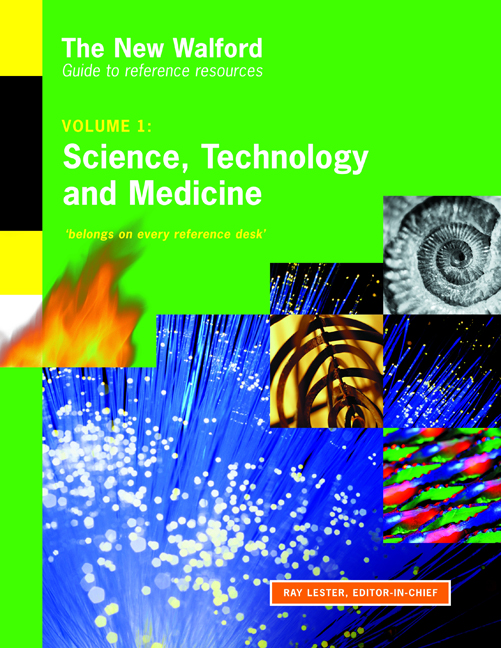Book contents
- Frontmatter
- Dedication
- Contents
- Preface
- Quick-start guide
- Editor and subject specialists
- 50 good websites to try first
- Introduction
- SCIENCE, TECHNOLOGY & MEDICINE: GENERIC RESOURCES
- Science, Technology & Medicine: Generic Resources
- SCIENCE
- MEDICINE
- TECHNOLOGY
- Tools for Information Professionals
- Indexes
- Topic Index
- Title/Author Index
Science, Technology & Medicine: Generic Resources
from SCIENCE, TECHNOLOGY & MEDICINE: GENERIC RESOURCES
Published online by Cambridge University Press: 08 June 2018
- Frontmatter
- Dedication
- Contents
- Preface
- Quick-start guide
- Editor and subject specialists
- 50 good websites to try first
- Introduction
- SCIENCE, TECHNOLOGY & MEDICINE: GENERIC RESOURCES
- Science, Technology & Medicine: Generic Resources
- SCIENCE
- MEDICINE
- TECHNOLOGY
- Tools for Information Professionals
- Indexes
- Topic Index
- Title/Author Index
Summary
Introductions to the subject
Information: the new language of science
H.C. Von Baeyer Weidenfeld & Nicolson, 2004, 192pp. Originally published 2003, £7.99. ISBN 0753817829.
‘Today we live in the information age. Wherever we look it surrounds us, and with the help of ever more efficient devices, from the internet through to mobile phones, we are producing, exchanging and harnessing more than ever before. But information does far more than define our modern age – at a fundamental level it defines the material world itself, for it is through its mediating role that we gain all our knowledge, and everything derives its function, existence and meaning from it.
In twenty-five short chapters, von Baeyer takes us from the birth of the concept of information and its basic language, the bit, through to the coal-face of contemporary physics and beyond relativity; black holes; randomness; abstraction – explaining why it has the power to become the most fundamental concept in physics – as fundamental as mass and energy.’
‘A sense of wonder is an essential prerequisite to an appreciation of the discoveries of science, and wonderment is the emotion that will be most pleasantly evoked in the reader of this book.’ (Times Higher Education Supplement)
The Oxford companion to the history of modern science
J.L. Heilbron [et al.], eds Oxford University Press, 2003, 941pp. £67.00. ISBN 0195112296.
Outstanding introduction – not just to ‘science’, but also to large parts of ‘technology’ and ‘medicine’. Perhaps most useful for those new to this arena are the entries relating to ‘The Body of Knowledge’: Epistemology and methodology; Cross-cutting concepts; Major subject divisions; Minor subject divisions; Theoretical constructs – with each article written in an approachable manner, stressing naturally the history, and appended with a short bibliography.
Supplementing these entries for the ‘basic’ sciences are the ones for the ‘applied’ sciences.
But there are also considerable numbers of discussions relating to the historiography of science, the organization and diffusion of science, the apparatus and instruments it uses, as well as about 100 biographies of key current and past scientists.
Finally, there is a good Further Reading section, and a comprehensive Index.
- Type
- Chapter
- Information
- The New Walford Guide to Reference ResourcesVolume 1: Science, Technology and Medicine, pp. 3 - 44Publisher: FacetPrint publication year: 2004



